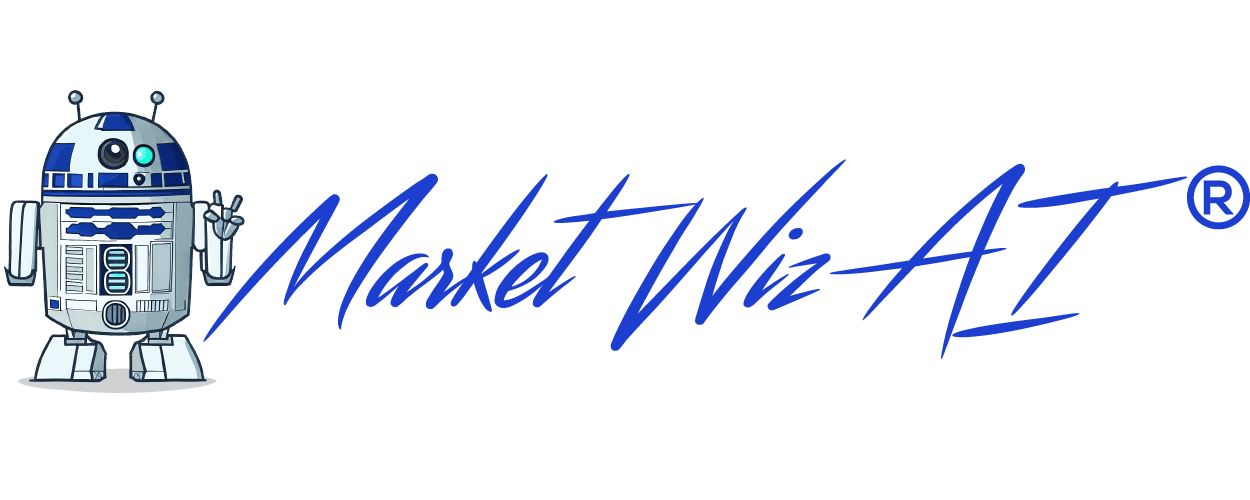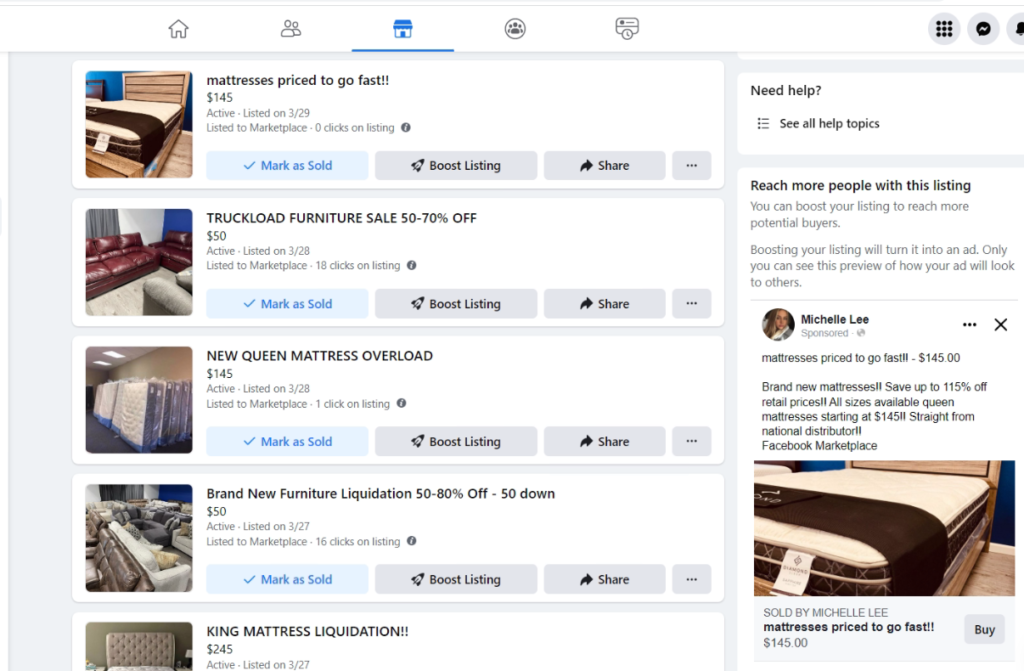If you’ve ever dealt with a temporary block or restriction on Facebook Marketplace, you’re familiar with the frustration. This is often colloquially referred to as “Facebook Marketplace Jail”. It can disrupt your business, reduce visibility, and add an extra layer of difficulty to your online selling process.
Fortunately, there are preventive measures you can take, and our team at Market Wiz is here to guide you. Let’s first understand the basics.
What is Facebook Marketplace Jail?
Simply put, it’s a temporary ban or restriction placed on your account by Facebook when it believes you’ve violated its community standards or Marketplace’s commerce policies. This can be due to various reasons including posting prohibited items, rapid listing of several items, or being reported by other users.
Steps to Avoid Facebook Marketplace Jail
- Understand Facebook’s Rules: Before listing an item, familiarize yourself with Facebook’s commerce policies. Avoid selling prohibited items such as drugs, weapons, or animals.
- Avoid Rapid Listing: Take your time while listing products. If you post too many items too quickly, it may seem suspicious, leading to a potential ban.
- Use Clear Photos: Use original images that clearly represent the item you’re selling. Avoid using stock photos or pictures from the internet.
- Be Transparent: Ensure that the product description is accurate. Misleading descriptions can lead to reports from buyers.
- Engage Positively: Treat everyone on the platform with respect. Avoid arguments, and always communicate politely.
- Avoid Spammy Behavior: Don’t send too many messages in a short period, and avoid using identical messages repetitively.
How Market Wiz Can Help
Our team at Market Wiz specializes in assisting businesses to navigate online platforms successfully. Here’s how we can assist you:
- Guidance on Listings: We can help you curate listings that are compliant with Facebook’s standards, ensuring a reduced risk of bans.
- Strategy Development: We’ll help you create a consistent posting strategy that avoids rapid listings and keeps you out of the “jail”.
- Training Sessions: Market Wiz offers regular training sessions, educating businesses on the nuances of online selling, focusing on best practices for Facebook Marketplace.
Avoiding Facebook Pages Locked Account
Another common issue users face is getting their Facebook Pages locked or restricted.
- Verify Your Identity: Ensure you have provided correct contact information and have verified your account, if asked by Facebook.
- Be Wary of Third-Party Apps: Sometimes third-party apps can access your Facebook Page and violate terms. Only integrate trustworthy apps.
- Regularly Review Page Roles: Make sure only trusted individuals have access to manage your Page.
- Monitor Content: Ensure that the content posted on the Page complies with Facebook’s Community Standards. This includes posts, photos, and ads.
- Engage Responsibly: If managing a business page, always engage professionally. Avoid heated debates or confrontations.
In conclusion, the key to avoiding “Facebook Jail”, whether on Marketplace or on your business page, is understanding the platform’s rules and acting responsibly. The team at Market Wiz is always here to help, ensuring you make the most of your online selling journey without any unwarranted hiccups.
Top 5 Reasons to Avoid Facebook Marketplace Jail and Its Impact on Business Owners
Facebook Marketplace has become an essential platform for businesses to showcase products and engage with local customers. However, landing in the so-called “Facebook Marketplace Jail” can halt your business operations. Here’s why you should avoid this at all costs:
Loss of Visibility and Engagement:
Impact: Facebook Marketplace offers a platform for businesses to reach a vast audience. When you’re unable to post ads, your products won’t get the exposure they need. This means potential buyers will be unaware of your offerings, leading to decreased engagement and, consequently, sales.
Disruption of Consistency:
Impact: Consistency is key in building trust and reliability. When you’re suddenly absent from the marketplace, your regular customers might feel uncertain. They might question the legitimacy of your business, or think you’ve gone out of business altogether.
Loss of Revenue:
Impact: This is a direct consequence of decreased visibility and engagement. No ads mean fewer leads and sales, leading to a decline in revenue. For businesses heavily reliant on Facebook Marketplace, this can be a significant hit to their bottom line.
Wasted Time and Resources:
Impact: Preparing a product for listing, from photographing it to crafting a compelling description, requires time and effort. Being blocked from posting after investing these resources can be disheartening and result in wasted efforts.
Reputation Damage:
Impact: Being absent from the marketplace or having your ads removed can raise eyebrows. Customers might assume that your business has violated community standards or engaged in shady practices, leading to reputational damage. It may also discourage potential partnerships or collaborations.
In conclusion, Facebook Marketplace Jail isn’t just an inconvenience; it has tangible negative effects on a business. As the digital landscape becomes increasingly competitive, it’s crucial for businesses to maintain a consistent, reputable, and active presence. Avoiding pitfalls like this ensures that your business continues to thrive and grow.
The Nuances of Navigating the Modern Digital Marketplace
The digital era has forever altered the landscape of commerce, making online platforms, including Facebook Marketplace, critical for businesses worldwide. As we’ve already established the importance of avoiding bans and restrictions, it’s also essential to understand the broader aspects of online selling to truly thrive in today’s marketplace.
- Building Trust in a Virtual World
Unlike physical stores where customers can touch, feel, or even try out products before purchasing, online platforms rely heavily on trust. Trust becomes the currency of exchange in such platforms.
Ways to Build Trust:
- Clear Product Descriptions: Provide detailed product descriptions and specifications. The more information you can give, the more assured a buyer will feel.
- High-quality Photos: Images should be clear, well-lit, and showcase the product from multiple angles.
- Prompt Replies: Always respond to queries or complaints promptly. It not only addresses customer concerns but also establishes you as a responsible seller.
- Genuine Reviews: Encourage satisfied customers to leave positive reviews and ratings. Potential buyers often refer to these reviews before making a purchase.
- The Power of Personalization
Modern customers expect personalization. They no longer want to be another statistic in your sales funnel; they want experiences tailored for them.
Implementing Personalization:
- Data Analysis: Use analytics tools to understand customer preferences. Look at their browsing patterns, wish lists, or past purchases.
- Customized Offers: Based on data, create special offers or discounts tailored to individual preferences.
- Personalized Communications: Whether it’s email marketing or direct messaging, ensure that your communication resonates with individual recipients.
- Mobile-First Approach
With the proliferation of smartphones, a considerable chunk of online shopping happens on mobile. Ensure your listings and website (if you have one) are mobile-friendly.
Why Mobile Matters:
- Increased Traffic: A majority of users browse and shop using their phones.
- Improved User Experience: Mobile-optimized interfaces are user-friendly, ensuring potential buyers don’t bounce off due to frustration.
- Diversifying Platforms
While Facebook Marketplace is powerful, don’t put all your eggs in one basket. Explore other platforms like eBay, Amazon, or Etsy, depending on your product category.
Benefits of Diversification:
- Risk Mitigation: If one platform restricts you, you have others to fall back on.
- Expanded Reach: Different platforms have varied audiences, ensuring you capture a broad spectrum of potential customers.
- Sustainability and Ethics in Business
Today’s consumers are increasingly conscious about sustainability and ethical business practices. They’re not just buying a product; they’re buying into what your brand represents.
Promoting Sustainability:
- Eco-friendly Packaging: Consider using recyclable or minimal packaging.
- Ethical Sourcing: Ensure your products are sourced responsibly, without exploiting labor or resources.
- Transparency: Be open about your practices. If you make a claim about being sustainable, back it up with evidence.
- Embracing Technology
From AI-driven chatbots for customer service to AR-powered virtual try-ons, technology is reshaping the shopping experience. Embrace it to stay ahead of the curve.
Incorporating Tech:
- Automated Customer Service: Use chatbots to handle basic queries 24/7.
- Virtual Showcases: For products like clothing or accessories, offer virtual try-ons.
- Understanding Global Trends
Even if you cater predominantly to a local audience, global trends can impact your market. Stay informed.
Why Global Matters:
- Shifting Preferences: A trend popularized in another part of the world could become a rage in your region.
- Supply Chain Implications: Global events can affect product availability, shipping times, and costs.
The vast world of digital commerce is complex, but it’s also teeming with opportunities. By understanding its intricacies, from building trust to embracing technology, businesses can not only navigate this space effectively but can also soar to new heights. As we move further into the digital age, the businesses that adapt, innovate, and prioritize their customers will be the ones that stand tall and succeed.
The Catastrophic Consequences of a Facebook Marketplace Ban for Small Businesses
In the digital age, the success of a small business hinges significantly on its online presence and engagement. Platforms like Facebook Marketplace have revolutionized the way small enterprises engage with their target audience, offering a seamless and direct channel for product display and sales. Given this backdrop, it’s hardly an overstatement to claim that being banned from Facebook Marketplace could be the most significant setback a product-selling small business owner can experience. Here’s a conclusive analysis of why such a ban is nothing short of catastrophic:
- Lost Avenue for Direct Sales
For small businesses, especially startups and local enterprises, Facebook Marketplace serves as a primary or significant sales channel. It offers a platform where they can reach customers without the hefty costs of setting up and maintaining a dedicated e-commerce website. A ban closes off this critical revenue stream, leaving the business grappling with reduced sales and possibly dwindling profits.
- Missed Brand Exposure
Beyond immediate sales, Facebook Marketplace is an exposure tool. Every time a product is listed, it reaches an audience that extends beyond just potential buyers to include those who might share or recommend the product to others. The ripple effect of such visibility is immeasurable. When a business gets banned, it doesn’t just lose out on direct viewership; it loses the potential network effect that could have amplified its reach manifold.
- Trust Deficit
The ban, especially if known or visible to potential customers, could signal non-compliance or unprofessional behavior. It could lead to a trust deficit. In an era where brand reputation is paramount, such negative publicity can be detrimental. Customers might question the legitimacy of the business or assume that it has flouted rules, leading them to look for alternatives, even if the ban was a result of a simple misunderstanding or error.
- Financial Strain
Small businesses typically operate with limited cash flows and thin profit margins. The sudden loss of a sales channel can result in financial stress. There’s not only the loss of potential revenue but also the sunk cost associated with any investments made towards optimizing for the platform. This could be in the form of advertising dollars spent, resources used for creating product listings, or even specialized staff training. The repercussions could range from cutbacks and layoffs to severe cases like insolvency.
- Derailed Growth Plans
For small businesses with growth trajectories tied to their online sales, a ban from Facebook Marketplace can entirely derail expansion plans. Whether it’s plans to launch new products, expand to new regions, or even just grow the customer base, the ban hampers them all. The lost momentum can take months, if not years, to recover, and some opportunities lost might never come back.
- Increased Operational Challenges
With the abrupt closing of a sales avenue, businesses might find themselves grappling with excess inventory, which leads to storage costs and potential write-downs if the products aren’t sold within their lifecycle. There’s also the challenge of pivoting sales strategies on the fly, which can be both time-consuming and resource-intensive.
- Emotional and Mental Toll
It’s essential to consider the human side of the business. Entrepreneurs pour their heart, soul, and countless hours into building and growing their ventures. A sudden setback, like a marketplace ban, can be emotionally draining. The stress, uncertainty, and financial strain can take a toll on the mental well-being of the business owner and their team.
- Compounded Digital Setbacks
In the digital world, setbacks can compound. A reduced digital footprint due to the ban might result in decreased search engine rankings or online visibility. Furthermore, algorithms often favor active and engaged businesses. A hiatus, like one induced by a ban, can result in the business getting less preference once it’s back, leading to a more extended recovery period.
While Facebook Marketplace is just one of the many digital platforms available for businesses, its significance, especially for small businesses, cannot be understated. It’s not merely a sales platform but an ecosystem that fosters brand growth, engagement, and trust. A ban from such a platform doesn’t just mean lost sales; it’s a cascading effect of setbacks that can jeopardize the very survival of a small enterprise. In this light, it’s evident why such a ban is arguably the worst experience a product-selling small business owner can endure in today’s digital age. It’s a stark reminder of the fragility of digital dependency and the need for diversification and compliance in the online arena.





